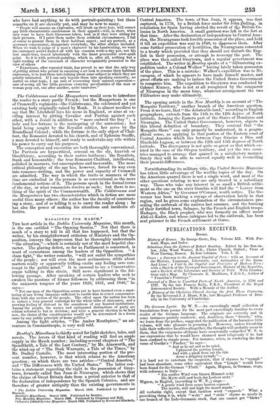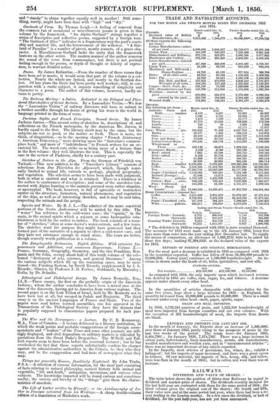PUBLICATIONS RECEIVED.
Booms.
History of Greece. By George Grote, Esq. Volume XII. With Por- trait, Maps, and Index.
Selections from the Letters of Robert Southey. Edited by his Son-in- law, John Wood Waster, B.D., Christ Church, Oxford ; Vicar of West Tarring, Sussex. In four volumes. Vols. I. II.
Cuzco : a Journey to the Ancient Capital of Peru : with an Account of the History, Language, Literature, and Antiquities of the Incas. And Lime: a Visit to the Capital and Provinces of Modern Peru : with a Sketch of the Viceregal Government, History of the Republic, and a Review of the Literature and Society of Peru. With Illustra- tions and a Map. By Clements It. Markham, F.R.G.S., Author of "Franklin's Footsteps."
Journal of a Tour in Unsettled Parts of North America, in 1796 and 1797. By the late Francis Rally, F.R.S., President of the Royal Astronomical Society. With a Memoir of the Author.
A History of the Christian Church during the first Three Centuries. By the Reverend I. J. Blunt, B.D., late Margaret Professor of Divi- mty in the University of Cambridge.
The German Lyrist. By W. N.—An exceedingly small collection of translations from poems for the most part exceedingly familiar to every reader of the German language. The originals are correctly and in some instances prettilydered ; and, doubtless those "friends," who, we learn from the preface, suggested the publication of the harmless little volume, will take pleasure in perusing it. However, unless friendship lulls their reflective faculties altogether, the thought will probably occur to them, that the exigencies of rhyme have occasionally compelled W. N. to use expressions that he would have shunned most religiously if he had been confined to simple prose. For instance, when, in rendering the first verse of Goethe's "Fischer," he says-
" And as he sat and as he spied, Upheaved the parting lymph,. And with splash from out the tide
Arose a dripping nymph,"—
it is hard not to entertain the suspicion, that if rhymes to " nymph " had been abundant, some other equivalent than " lymph " would have been found for the German " Fluth." Again, Mignon, in German, sings, with reference to Italy- "Emn swifter Wind vom blauen Himmel weht Die lifyrte still und hoch der Lorbeer steht."
Mignon, in English, (according to W. N.,) sings— "A A gentle wind from azure heaven expands
The myrtle, still and high the laurel stands." All verbatim right, except that luckless word "expands." What a provoking thing it,is when " weht" and " steht " rhyme so nicely in
one branch of the Indo-Germanic stock, that one cannot get "blows" and " standa" to chime together equally well in another ! Still Some- thing, surely, might have been done with "high" and "sky."
Garlands of Verse. By Thomas Leigh.-A feeling of removal from the common run of occasional or miscellaneous poems is given to this volume by the framework. "An Alpine Garland" strings together a 1127leis of descriptive and reflective poems, suggested by a foreign tout. "The Garland of Alice" indicates in a fragmentary way the poet's court- ship and married life, and the bereavement of the widower. A Gar- land of Paradise" is a number of pieces mostly sonnets, of a grave cha- racter. A Miscellaneous Garland lack; the unity that the framework bestows on the other series. The modern manner of the author removes the sound of the verse from commonplace, but there is not poetical feeling enough in the poems, or depth of thought or felicity of expres- sion, to warrant detailed notice.
Poems. By James Ballantine.-From the number of these verses that have been set to music, it would seem that part of the volume is a col- lection. Nearly the whole are lyrical, and mostly in the Scottish dia- lect. Of late years the Doric has been pretty well worked ; still, in con- junction with a rustic subject, it imparts something of simplicity and character to a poem. The author of this volume, however, hardly at- tains to poetry.
The Railway Meeting : a Satire. Dedicated to the Pillaged and Plun- dered Shareholders of Great Britain. By a Lancashire Victim.-We fear the "Lancashire Victim" of railway directors will have to submit to a further sacriffee through his desire of giving his woes to the world in language printed in the form of verse.
Parisian Sights and French Principles. Second Series. By James Jackson Jarves.-This second series of sketches in, descriptions of, and reflections on the French metropolis, by the American Mr. Jarves, is hardly equal to the first. The literary merit may be the same, but the subjects are not 80 good, or the matter so fresh. There is more, we think, of disquisition,-as in the opening chapter "French Aristocracy v. American Democracy," more drawing upon the "historian's common- place book," and more of " indebtedness " to French writers for an oc- casional bit. The wood-cuts strike us as being more of a feature than in the first volume : they well illustrate the text. This is especially the case in the review of Fashions, chiefly for a century past.
Sketches of Nature in the Alps. From the German of Friedrich von Tschudi.-This new addition to the "Traveller's Library" consists of selections from Das Thierleben der Alpenwelt, which, though nomi- nally limited to animal life, extends to geology, physical geography, and vegetation. The selection seems to have been made with Judgment, both in what is omitted and what is retained. There is a tendency in the author to exuberance of description and some of the anecdotes con- nected with Alpine hunting or the animals pursued seem rather singular, or apocryphal. The book, however, is full of agreeable or instructive matter on the structure, formation, natural phenomena, and vegetation of the Alps, as well as of interesting sketches, and it may be said tales, respecting the animals and the people.
Spirits and Water. By R. J. L-The admirer of the more convivial portions of the Nodes Ambrosiatue will be misled by this title. The water" has reference to the cold-water cure ; the spirits," in the main to the animal spirits which a sojourn at some hydropathic esta- blishment is held by the author to induce. The book consists of a num- ber of "sketches," often at some doctor's water-retreat, and a few tours. The sketches want the purpose they might have possessed had they formed part of the narrative of a sojourn to effect a cold-water cure, and they have not substance enough to stand alone. The tours are better, though scarcely worth publication in a volume.
The _Encyclopedia Britannica. Eighth Edition. With extensive Im- provements and Adclitions, and numerous Engravings. Volume France, Germany, Geography, Geometry, and the two Franklins, Ben- jamin and Sir John, occupy about half of this tenth volume of the cele- brated "dictionary of arts, sciences, and general literature." Among the various subjects which fill up the remaining space, may be men- tioned-the Funding System, by David Ricardo, supplemented by J. L. Ricardo; Glacier, by Professor J. D. Forbes; Goldsmith, by Macaulay ; doths, by Dr. Schmitz.
Ethnological and Philological Essays. By James Kennedy, Esq., LL.B.-Three essays, the first on the probable origin of the American Indians ; whom the author concludes to have been a mixed race at the time of the discovery, having got to America from various regions. The second paper is on the Lost Tribes of Israel, held by Mr. Kennedy not to have been lost at all, but merged in Judah and Benjamin. The third essay is on the ancient Languages of France and Spain. Two of the papers were read before learned assemblies, one has appeared in the Transactions of the Philological Society : they have the dryness that is popularly supposed to characterize papers prepared for such pur- poses.
The War and the Newspapers : a Lecture. By C. E. Kennaway, M.A., Vicar of Camden.-A lecture delivered to a literary institution, in which the weak points and probable exaggerations of the foreign corre- spondents and " leaders " of the Times and some other journals are tell- ingly displayed, and civil dosmatiam on military matters is ridiculed by quotations from the Great Duke's Despatches. The M'Neill and Till- loch reports seem to have been before the reverend lecturer • but he has overlooked the fact that those reports substantially confirm" the charges against the administrative authorities in the Crimea, be they who they may, and be the exaggeration and bad taste of newspapers what they may.
Things not generally Known, familiarly Explained. By John Tiinbs, F.S.A.-A selection of curious information for the most part consisting of facts relating to natural philosophy, natural history both animal and vegetable, "life and death," antiquities' inventions, and various other subjects. The knowledge imparted will be found curious and sometimes useful ; the variety and brevity of the " things " give them the charac- teristics of anecdote.
The Life of Luther written by Himself; or the Autobiography of Lu- ther in Passages extracted from his Writings.-A cheap double-column edition of a translation of Michelet's work.



































 Previous page
Previous page